Initial development of the Agro-Ecological Village Model: The Southern Negros Sustainable Agriculture Development Project (SNSADP)
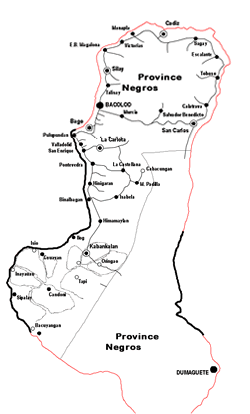
|
2. In 1998, REAP-Canada initiated its development programming activities on Negros Island in the Philippines with Paghida et sa-Kauswagan Development Group (PDG) and the MAPISAN Farmers Alliance in Southern Negros, along with national support from the MASIPAG Farmer-Scientist Partnership network and the University of the Philippines at Los Banos.
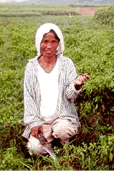
|
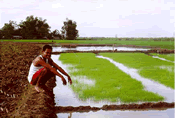
|
The 3 years of SNSADP programming resulted in the following achievements:
- 22 demonstration plots in six communities evaluating:
- diversification with 25 cropping alternatives
- sugar cane trash farming
- vegetable and grain legume adaptation trials testing 17, 12, 11,10, 9 and 3 varieties, respectively
- 646 farmers were trained on ecological farming, 42% (245) of which were by women
- Provision of 47 additional trainings to 1379 farmers
- 5 conferences were held involving 859 participants
- 71 farm plans were completed
- microcredit programs were established for households
- 2 sustainable farming manuals were created and sustainable agriculture library materials were provided to the Negros Occidental Agricultural College
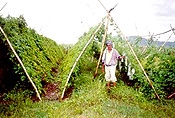 |
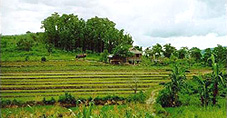 |
| Farmers learned to diversify their farms and grow high value vegetables as better gourd | A learning farm developed to demonstrate sustainable practices and diversified farming systems |
Community's Experience
Improved food security and higher income levels because of an increased ability to meet their basic needs, improve production and minimize indebtedness. Although not apparent in all farming communities, some farm families (particularly those that have had the most successful adoption of practices such as vegetable diversification) have reported a higher degree of food security and increased income levels stemming from sustainable farming techniques.Increased adoption of sustainable farming techniques among members of the MAPISAN Alliance though continued development of community trainings and demonstrations over the past several years of project implementation. Farmer empowerment has risen and has continued to grow beyond the lifespan of the project as farmers increasingly apply their new knowledge and gain confidence from positive experiences, measured by the self-sufficiency of farmers and their readiness to investigate new farming practices. Farming systems diversification enables the marketing of a diverse array of locally produced vegetables in the Philippines.
AEV program activities focused on the development and demonstration of cropping system diversification, farm ecologization and rural community empowerment assisted with organizational, financial, educational and technical support. Innovative programs which proved to have significant impacts to the communities and their environment included:
- The Mayon Turbo Stove (MTS): Reducing Poverty and Greenhouse Gas Emissions in the Philippines
- Ecological Sugarcane Farming: From Sugarcane Monoculture to Agro-Ecological Village
- Development of ECO-RICE for increased rice productivity
The Philippine Sustainable Seed and Agricultural Development Project (PSSA)
In the Philippines, the challenge exists for farmers, non-government organizations (NGOs), scientists, academic institutions and other stakeholders to develop practical approaches that support sustainable agriculture. Economically, it is necessary to develop resource-efficient farming systems, as well as innovative mechanisms for their delivery and for the capacity building of farmers, with the limited financial resources available within the Philippines. The farmers themselves need to take control over their production, training and plant improvement programs and work in partnership with researchers/scientists and NGOs, in order to advance sustainable agricultural systems that perform productively in resource-limited rural communities. The Pambansang Inisyatibo sa Binhi at Likas Kayang Pagsasaka sa Pilipinas (PABINHI) Network and its programs were developed with this goal in mind. The farmer led/scientist assisted network is at the forefront of the sustainable agriculture movement in the Philippines, building upon 20 years of existing experience in participatory assessment, training and on-farm research.REAP-Canada partnered with PABINHI through a CIDA-sponsored project which aimed to empower farmer's organizations to develop sustainable farming and seed systems in some of the most impoverished areas in the Philippines. This was a means to reduce poverty, enhance food security, increase self-reliance and farm productivity, promote gender equality and reduce environmental degradation in the Philippines. The project was implemented from 2004-2006 using innovative participatory assessment, training and research methods. The project focused on:
- Strengthening the capacity of farmer's organizations in the PABINHI network in some of the most impoverished areas in the Philippines including Panay islands and Guimaras;
- Enhancing sustainable agriculture training through development of PABINHI's farmer-to-farmer training network and training modules to support the development of ecological farming systems in the Philippines;
- Developing a network of Sustainable Agriculture Learning Farms amongst the peoples organizations as a new mechanism to support farm development; and
- Supporting the genetic conservation, distribution, testing and local multiplication of food crops such as: rice, corn, millet, grain legumes, root crops, vegetables and other crops suitable for sustainable farming through an adaptability trial farm approach.
The PSSA program resulted in the following achievements:
The goals, responsibilities, and activities of each farmer organization was defined and used in the development of a project workplan, which continued to be refined and adjusted according to local needs at the regular meetings held during the project;
- 47 farmer trainers (26% or 12 women) were trained on ecological farming methods including seedbanking, ECO-rice, nature farming and Bokashi production;
- A total of 672 individual farmer trainings were delivered during the project with an average of 27% female participation (181 individual farmer trainings to women).
- 45 Sustainable Agriculture Learning Farms (SALF's) were identified and developed. The SALF's included adaptability trials for native or new and improved seeds, organic (Bokashi) fertilizer incorporation and soil fertility improvement, biodynamic preparation application (nature farming), Income Generating Projects, diversification (agro-forestry, medicinal plants, aquaculture), Farmer Developed Appropriate Technologies (FDAT's) and demonstration of ecological farming systems;
- Five Community Seed Banks (CSB's) were established and developed. The CSB's included live seedbanks and farmer breeding trials. An inventory of varieties of rice, trees, forage grasses, foods and medicinal plants was also developed;
- Testing of varieties and species included: rice, vegetables, agro-forestry, fodders, legumes and vegetables (mungbean, string bean, eggplant, okra) and emphasized drought tolerance, pest resistance and ecological practices;
- A production guide for vegetables including bittergourd, squash, tomato, cassava, corn, peanut, okra, sponge gourd, pechay, cucumber, hot pepper, papaya, bush stringbean, pole stringbean and eggplant was also distributed to farmer trainers;
- Community-scale production of Bokashi resulted in the production and application of 33 tonnes of organic fertilizer. The versatility of Bokashi and other organic fertilizers appealed to many local chemical-based farmers, the majority of which have been exposed to chemical fertilizers for over 30 years. Because of its powerful soil restoration properties, Bokashi is an important method that can make the conversion to organic agriculture feasible for small landowners by reducing the associated risk. Bokashi production was a great way to draw members into the project, and the PSSA project was the first significant development effort in Bokashi in the Philippines;
- The PSSA project has employed a novel approach in holding theoretical strategic-planning sessions in conjunction with other technical trainings so that farmers will feel as if they not only contributed something, but were also able to learn something of practical value while attending training sessions;
- The transfer of sustainable agriculture methods and technical knowledge through farmer-to-farmer training and learning farm development has developed local confidence in ecological agriculture, which has enabled the community to approach future agricultural constraints together and in a holistic manner.
To learn more about our programming efforts with partners in the Philippines, refer to the documents in our on-line library.




